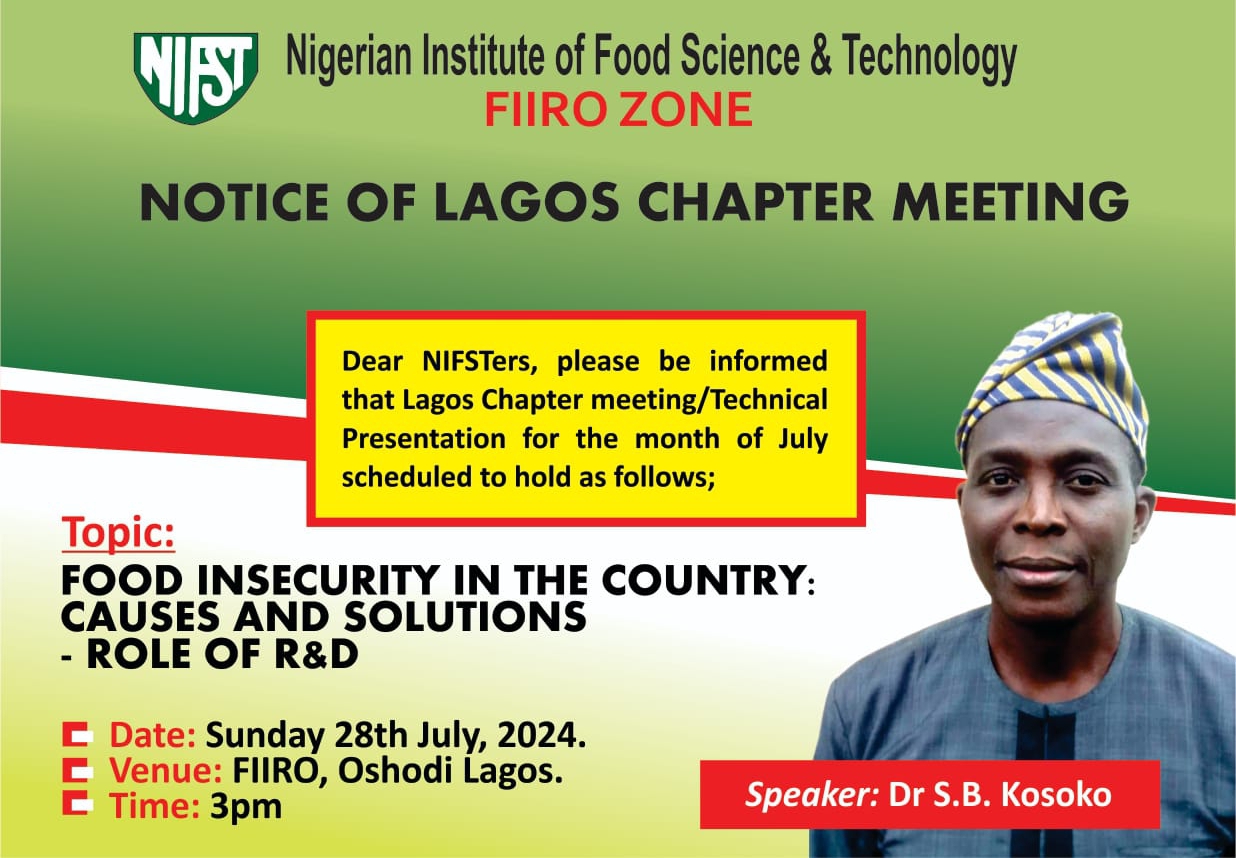The recent session at the NIFST Lagos chapter meeting, hosted by the Federal Institute of Industrial Research Oshodi (FIIRO) Zone, provided valuable insights into industrial research and development in Nigeria. Dr. S.B. Kosoko delivered an engaging presentation on “Food Insecurity in Nigeria: Causes and Solutions – The Role of R&D.”
Dr. Kosoko began by defining food insecurity as the lack of consistent access to sufficient food to maintain an active and healthy life. He clarified that food insecurity involves more than just eating; it also includes obtaining essential nutrients. He emphasized that food insecurity and nutrition are interrelated but distinct issues. Major factors contributing to food insecurity include poverty and population growth.
The seasoned researcher outlined the global scope of food insecurity, noting that approximately 870 million people worldwide are hungry, with 98% residing in developing countries, especially Sub-Saharan Africa, India, and China. In Nigeria alone, around 26.5 million people face severe food insecurity, particularly affecting children in the northeastern regions.
The presentation highlighted Africa’s significant struggles with food insecurity, often marked in red and yellow on global maps. Key factors include population growth, conflict, and poverty. He explained that food security entails having adequate access to both the quality and quantity of food. Food insecurity can range from moderate uncertainty to severe inadequacy, where some individuals may go days without food.
He discussed various causes of food insecurity, such as globalization, conflict, poverty, climate change, food shortages, price volatility, hoarding, and contamination. He cited a viral video of the Oni of Ife addressing market hoarding, which exacerbates artificial scarcity. Symptoms of food insecurity include deteriorating health, hunger, loss of life, civil unrest, and economic instability.
To address food insecurity, Dr. Kosoko proposed solutions focused on ensuring food availability, affordability, and stability. Nigeria’s low ranking on the global food security index reflects significant challenges. He recommended enhancing agricultural productivity, strengthening value chains and market systems, investing in rural infrastructure, empowering small holder farmers, and improving policy and governance.
He emphasized the critical role of research and development (R&D) in tackling food insecurity. Despite Nigeria’s numerous research institutes and universities, there are gaps in translating research into practical solutions for farmers and food producers. Dr. Kosoko called for coordinated efforts, capacity building, and effective extension services.
In conclusion, he advocated for promoting sustainable local food production, reducing post-harvest losses, and adopting technologies to improve food storage and processing. He urged the Nigerian Institute of Food Science and Technology (NIFST) and other professional bodies to play a pivotal role in advising on best practices to ensure food security in Nigeria.

Dr. S.B. Kosoko, Delivering a Presentation on Food Insecurity in Nigeria: Causes and Solutions -Role of R&D.

Excos – Mrs Amoreoluwa Kikelomo, Precising Over the Meeting.




Cross Section of Members at the Meeting.

Cross Section of NIFSTers at the Meeting.

Cross Section of Some Fellows @ the Meeting.





That was an enlightening session! Kudos to our Presenter!!
Everyone has a role to play in reducing the food Insecurity in Nigeria. Individuals were encouraged to do home gardening, while we step up on trainings on techniques for post harvest loss reduction. Government however needs to look into solving Insecurity problem, provide good access roads and storage facilities in farms and commodities markets, so as to minimize post harvest losses of our perishables.
It was very interesting, educating and quite revealing. I wish we all can contribute our own little to make a difference. Weldone Dr. SBK
Nice 1.
Good one from NIFST
Hi, constantly i used to check blog posts here early in the daylight, as i enjoy to gain knowledge of
more and more.